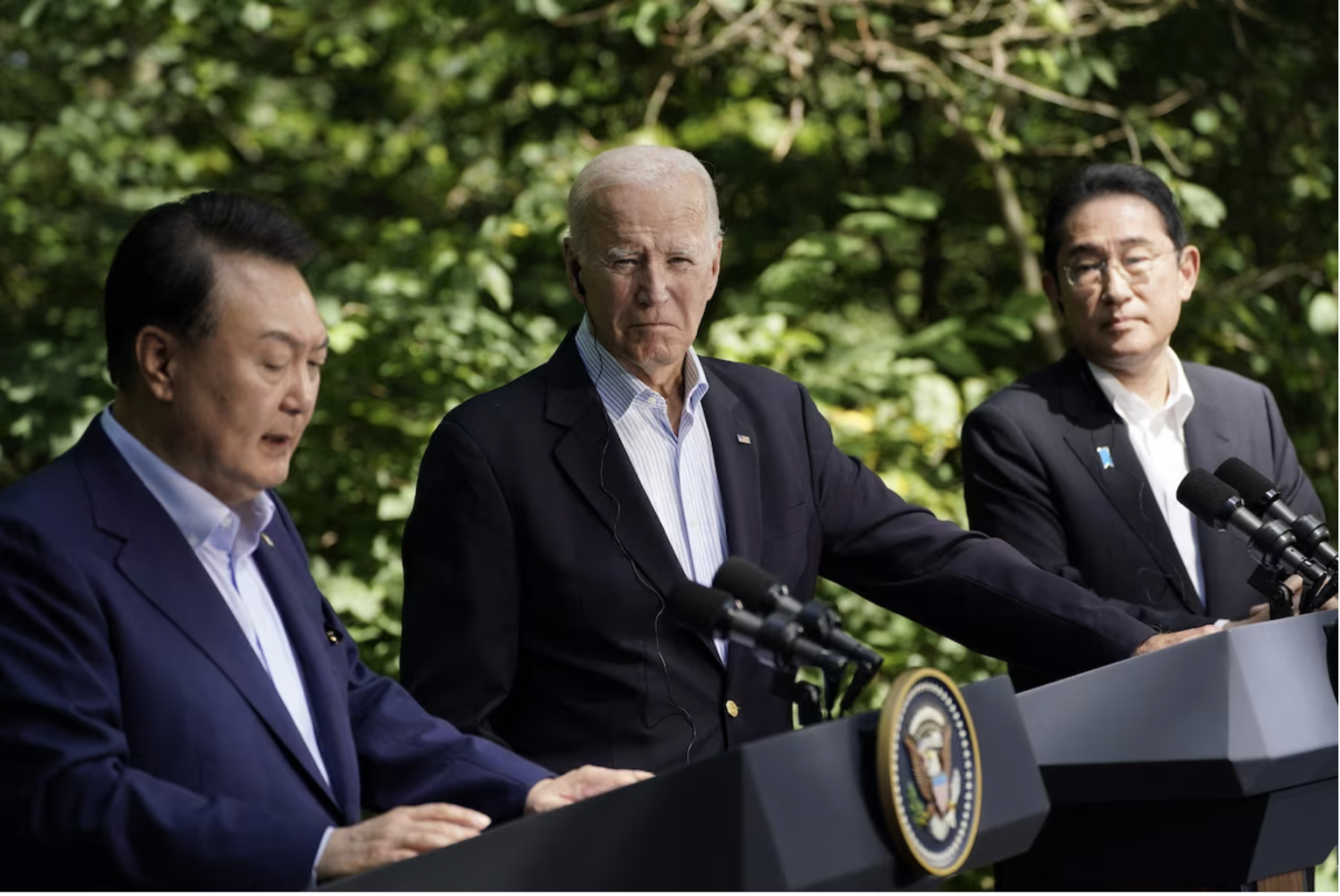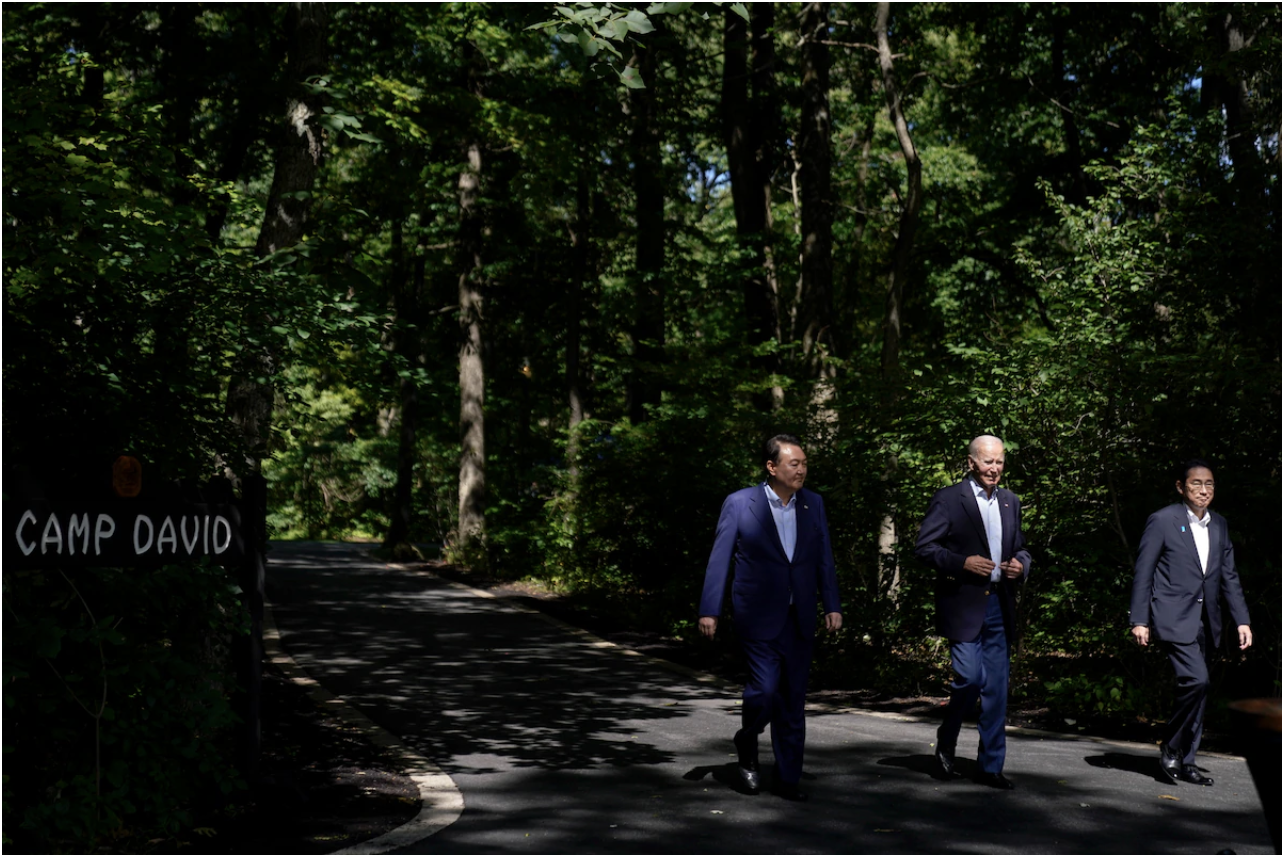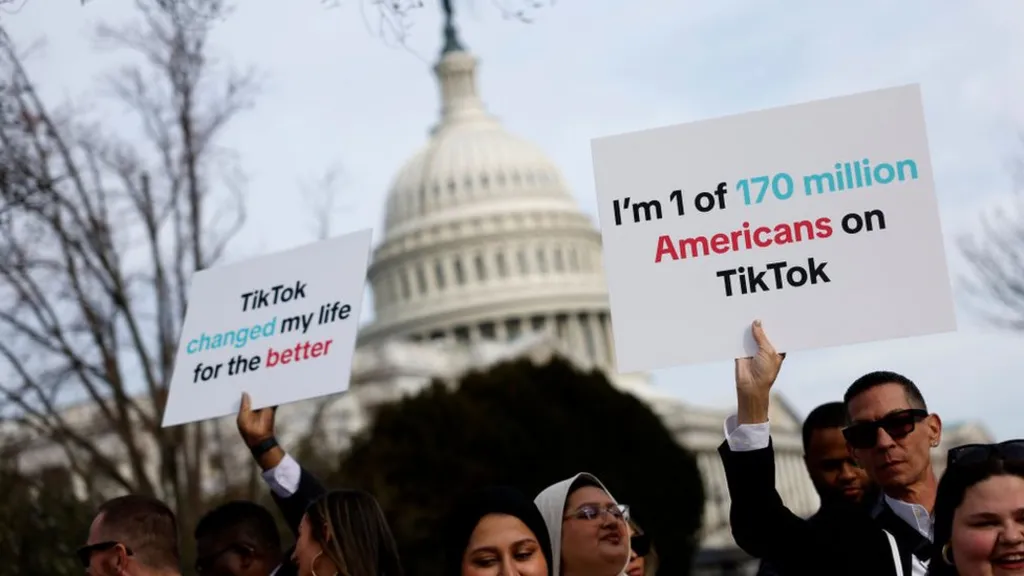This article is more than
1 year oldBiden declares ‘new era’ of partnership with South Korea and Japan

CAMP DAVID, Md. — President Biden sought to mark a “new era” for one of the United States’ most high-profile trilateral partnerships Friday, using a first-of-its-kind summit with his Japanese and South Korean counterparts at Camp David to announce new measures on defense, technology, education and other key areas of cooperation.
“This is the first summit I’ve hosted at Camp David, and I can think of no more fitting location to begin the next era of cooperation,” Biden said at a joint news conference, standing between Japanese Prime Minister Fumio Kishida and South Korean President Yoon Suk Yeol at his presidential retreat in Maryland and pledging that the commitments the leaders agreed to would stand the test of time. “This is about decades and decades.”
The summit was the culmination of what White House aides have described as a two-year effort to assist in a rapprochement between South Korea and Japan after decades of frosty relations. It also marked the beginning of what the White House hopes will be an extended stretch of three-way engagement, designed in part to counter China’s military aggression and economic coercion and North Korea’s growing nuclear weapons program.
Major deliverables from the summit included a “commitment to consult,” an agreement that a security threat to one of them would require mutual discussion about a joint response. The agreement was widely viewed as a response to a growing sense of risk emanating from Beijing and Pyongyang, but officials made sure to clarify that the agreement was not a collective defense treaty and that it stopped short of the kind of ironclad duty to “take action” found in the NATO treaty’s Article 5 provision.At a joint news conference at Camp David on Aug. 18, President Biden announced that his commitment to South Korea and Japan was "ironclad." (Video: The Washington Post)
Other measures included agreements to hold annual meetings of the nations’ three leaders, enhanced cooperation on ballistic missile defense and a new hotline to help the three governments communicate during a crisis.
On economic security issues, the three leaders agreed to work together more closely to shore up global supply chains with an “early warning” system to head off shortages of critical technologies.
The summit was designed to be rich in symbolism: Camp David was the site of historic 1978 peace accords between Israel and Egypt, and Biden wished to celebrate Seoul and Tokyo moving beyond decades of recrimination toward a new amity that has grown out of a desire to counter common foes including China and North Korea.
Beijing has long been critical of efforts by the Biden administration to rally allies and partners — efforts that U.S. officials say China has noted with growing chagrin. It has called Friday’s summit and other multilateral initiatives moves toward creating a “mini NATO” or an “Asian NATO.”
On Friday, Chinese Ministry of Foreign Affairs spokesman Wang Wenbin repeated the theme. “No country should seek its own security at the expense of other countries’ security interests and regional peace and stability,” he said adding that the Asia-Pacific region should not be “turned into a wrestling ground for geopolitical competition.”
National security adviser Jake Sullivan, speaking at a press briefing Friday morning at Camp David, rejected the notion of a “mini NATO.”
The partnership, he said, is “explicitly not a NATO for the Pacific.”

The summit and joint statement were “truly historic”— and not just because it was the first such stand-alone summit, said Yuki Tatsumi, co-director of the East Asia Program at the Stimson Center. “This signifies the three leaders’ determination to elevate this relationship to be an anchor of a free and open Indo-Pacific, to institutionalize it in a way that makes it difficult for their successors to walk back the commitments made today.”
The suite of commitments is wide-ranging, from annual cabinet-level trilateral meetings and real-time data-sharing on missile threats from North Korea, to enhancing cybersecurity and economic security, to coordination of development assistance to the Indo-Pacific region.
Taken together, said Victor Cha, a Georgetown University professor and former East Asia aide in the George W. Bush White House, “it amounts to a new trilateral military alliance” with a formal, named annual military exercise as the “signature.”
The three countries “won’t call it that,” said Cha. “But if it quacks like a duck, it’s a duck.”
Also significant, analysts said, was the joint statement’s explicit calling out of the “dangerous and aggressive behavior” of China in the South China Sea, a reference to China’s transformation of atolls into military facilities and hostile maneuvers against other countries’ ships and planes. Korea has traditionally been reluctant to explicitly criticize China, but Yoon has been more willing than past Korean presidents to criticize Beijing’s belligerent actions, said Christopher Johnstone, Japan Chair at the Center for Strategic and International Studies.
But the leaders — who went tieless and frequently beamed at each other — were eager to stress the positive, to cast the newly consecrated partnership in terms of how it will help the region prosper.
“This summit was not about China; that was not the purpose of the meeting,” Biden said. “This summit was really about our relationship with each other.”
Kishida called the new Camp David Principles, which include an affirmation that the purpose of the new collaboration is to promote peace and stability in the region, a “historic turning point” and “a new compass for trilateral cooperation.”
Yoon said “what is most important here is not about our own interest. … We can make a contribution to the advancement of freedom and peace in the world. And that’s exactly where our interests are aligned.”
The summit has been long in the making. Biden, who campaigned on restoring alliances, took office determined that the South Korea-Japan relationship should improve and the trilateral partnership should become “the backbone of our alliances” in the Indo-Pacific, said a senior administration official this week.
Ahead of the gathering, administration officials stressed how significant Biden considers the relationship with these two allies. Yoon and Kishida are his first foreign leader guests at Camp David (as well as the first foreign leaders there since 2015). Yoon and Kishida’s predecessors were the first foreign leaders to visit the White House in 2021. And Tokyo and Seoul were Biden’s first two stops in his first foreign trip to Asia.
In recent months, Yoon has taken unprecedented steps to resolve differences with Japan over the latter’s use of forced Korean labor during its occupation of the Korean Peninsula from 1910 to 1945. Those steps have helped pave the way for the agreements announced Friday.
Still, the growing sense of bonhomie has not fully resolved all lingering tensions in the multifaceted relationships. Japan and South Korea, for example, have each bristled at some of Biden’s economic policies. Biden’s push to boost U.S. manufacturing and crackdown on China’s development of advanced technologies like semiconductor chips has occasionally caused collateral damage for companies in Japan and South Korea, diplomats have said.
As the largest trading partner for both countries, China is home to millions of consumers and workers key to the bottom lines of Japanese and South Korean businesses. Officials in Beijing have responded to U.S.-led export controls and with punitive economic measures of its own, some of which have targeted Seoul and Tokyo.
The trilateral engagement is a significant piece of a growing web of multilateral partnerships the administration has created with an eye toward sustaining what it and allies call a “free and open Indo-Pacific.”
In the last two years, it has elevated the Quad diplomatic partnership with India, Japan and Australia to the leader level. It has agreed with Canberra and London to supply Australia with nuclear-powered submarines, which involves the transfer of highly sensitive technology. It has stepped up relations with Delhi, which will now make General Electric fighter-jet engines in India; with the Philippines, which is expanding U.S. military access to Philippine bases; with Japan, which is buying U.S. Tomahawks and allowing an advanced Marine regiment to position itself in islands southwest of Okinawa; and with South Korea, with which it has set up a framework to consult on plans for responding to a potential nuclear attack from North Korea.
Japan, the only country to ever have nuclear weapons used against it, declined to participate in the Nuclear Consultative Group launched by Biden and Yoon.
Still, if the three leaders had any disagreements during their hours of meetings behind closed doors, they managed to present a united front during a chummy news conference in which each man appeared relaxed.
“If I seem like I’m happy, it’s because I am,” Biden said to kick off the event. “This has been a great, great meeting.”
Keywords
Newer articles
<p>TikTok is getting closer to being kicked out of the US after the Senate approved a bill that would ban the platform unless its Chinese owner ByteDance sells the company.</p>
Ukraine war: Kyiv uses longer-range US missiles for first time
TikTok faces US ban as bill set to be signed by Biden
The EU warned TikTok’s new rewards feature could be addictive. Now the app's suspended it
King’s Funeral Plans Dusted Off—as Health Remains a Mystery
KANYE WEST PLANS TO LAUNCH 'YEEZY PORN' ... Could Be Coming Soon!!!
Megan Thee Stallion’s Ex-Makeup Guru Talks. It’s Not Pretty.
Here’s why Iran decided not to attack Israel again
Trump lawyer tells SCOTUS that president could have immunity after ordering military to assassinate a political rival
China warns relations with US could slip into ‘downward spiral’ if red lines crossed
